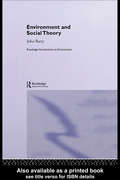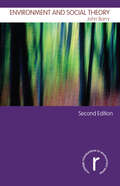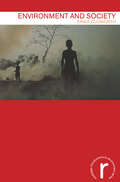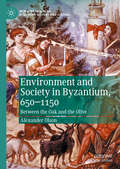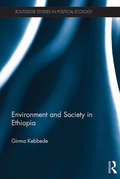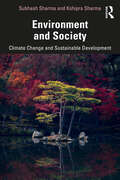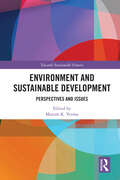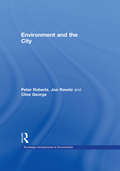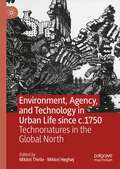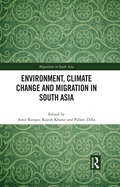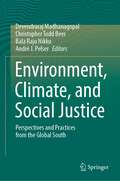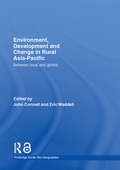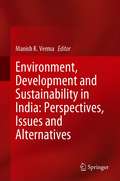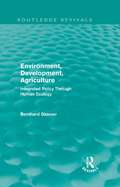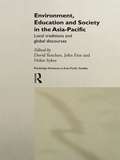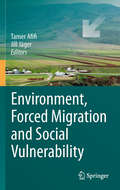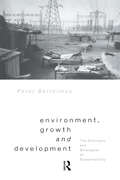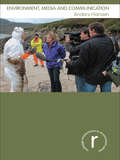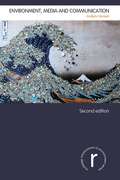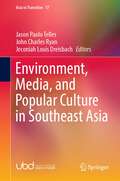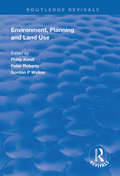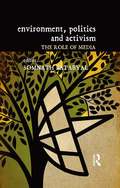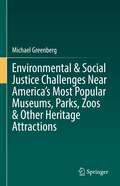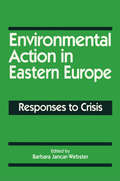- Table View
- List View
Environment and Social Theory
by John BarryWritten in an accessible and jargon-free way, Environment and Social Theory examines: * the historical relationship between social theory and the environment *pre-Enlightenment and Enlightenment social theory and the environment * twentieth century social theory and the environment * economic theory and the environment * the relationship between ecology, biology and social theory * recent theoretical approaches to the environment * the development of a green social theory The ideas and vies of key theorists including Hobbes, Locke, freud, Habermas, Giddens and Beck are discussed to provide comprehensive coverage of social theory for non-specialist readers.
Environment and Social Theory (Routledge Introductions to Environment: Environment and Society Texts)
by John BarryWritten in an engaging and accessible manner by one of the leading scholars in his field, Environment and Social Theory, completed revised and updated with two new chapters, is an indispensable guide to the way in which the environment and social theory relate to one another. This popular text outlines the complex interlinking of the environment, nature and social theory from ancient and pre-modern thinking to contemporary social theorizing. John Barry: examines the ways major religions such as Judaeo-Christianity have and continue to conceptualize the environment analyzes the way the non-human environment features in Western thinking from Marx and Darwin, to Freud and Horkheimer explores the relationship between gender and the environment, postmodernism and risk society schools of thought, and the contemporary ideology of orthodox economic thinking in social theorising about the environment. How humans value, use and think about the environment, is an increasingly central and important aspect of recent social theory. It has become clear that the present generation is faced with a series of unique environmental dilemmas, largely unprecedented in human history. With summary points, illustrative examples, glossary and further reading sections this invaluable resource will benefit anyone with an interest in environmentalism, politics, sociology, geography, development studies and environmental and ecological economics.
Environment and Society (Routledge Introductions to Environment: Environment and Society Texts)
by Erika CudworthAt the start of the twenty-first century, it can be argued that human societies have a greater impact on the environment than ever before. We have always been dependent upon, and interacted with, the 'natural' environment. However, the dramatic social changes of the past three centuries, have altered the form of our relationship with non-human nature to the extent that some would see people/planet relations as in a situation of crisis.Environment and Society provides a comprehensive and critical account of the ways in which we can think about the relationship between human societies and the environments with which they interact. It argues that human societies are ecologically embedded, and that environments are often socially embedded and constituted. It makes the different theoretical positions and empirical studies accessible to students, and includes chapter outlines and summaries, annotated further reading, boxed case-studies and discussion points.
Environment and Society in Byzantium, 650-1150: Between the Oak and the Olive (New Approaches to Byzantine History and Culture)
by Alexander OlsonThis book illuminates Byzantines' relationship with woodland between the seventh and twelfth centuries. Using the oak and the olive as objects of study, this work explores shifting economic strategies, environmental change, and the transformation of material culture throughout the middle Byzantine period. Drawing from texts, environmental data, and archaeological surveys, this book demonstrates that woodland's makeup was altered after Byzantium's seventh-century metamorphosis, and that people interacted in new ways with this re-worked ecology. Oak obtained prominence after late antiquity, illustrating the shift from that earlier era's intensive agriculture to a more sylvan middle Byzantine economy. Meanwhile, the olive faded into the background, re-emerging in the eleventh and twelfth centuries thanks to the initiative of people adapting yet again to newly changed political and economic circumstances. This book therefore shows that Byzantines' relationship with their ecology was far from static, and that Byzantines' decisions had environmental impacts.
Environment and Society in Ethiopia (Routledge Studies in Political Ecology)
by Girma KebbedeEthiopia is facing environmental and poverty challenges, and urgently needs effective management of its environmental resources. Much of the Ethiopian landscape has been significantly altered and reshaped by centuries of human activities, and three-quarters of the rural population is living on degraded land. Over the past two decades the country has seen rapid economic and population growth and unparalleled land use change. This book explores the challenges of sustaining the resource base while fuelling the economy and providing for a growing population that is greatly dependent on natural resources for income and livelihoods. Adopting a political ecology perspective, this book comprehensively examines human impacts on the environment in Ethiopia, defining the environment both in terms of the quantity and quality of renewable and non-renewable natural resources. With high levels of economic production and consumption also come unintended side effects: waste discharges, emissions of pollutants, and industrial effluents. These pollutants can degrade the quality of water, air, land, and forests as well as harm the health of people, animals, and other living organisms if untreated or disposed of improperly. This book demonstrates how the relationship between society and environment is inherently and delicately interwoven, providing an account of Ethiopia’s current environment and natural resource base and future considerations for environmentally sustainable development.
Environment and Society: Climate Change and Sustainable Development
by Subhash Sharma Kshipra SharmaThis book presents a comprehensive, lucid, and accessible approach to environmental sociology. It traces the origins of environmental sociology and examines the realist–constructionist debate in ecology for a holistic exploration of the field. The volume: • Presents a step-by-step systematic approach to the study of environmental sociology • Includes case studies from Asia, Africa, Europe, and the Americas and introduces theoretical perspectives from Asia, Africa, and South America to provide a more comprehensive view of the field • Has separate chapters on sustainable development and climate change • Discusses ecological movements in India and highlights environmental issues of the Global South A key text for undergraduates, postgraduates, and civil services aspirants, this book goes beyond western scholarship to include indigenous approaches to the field. It will be indispensable for students of sociology, climate change, environmental studies, and sustainable development.
Environment and Sustainable Development: Perspectives and Issues (Towards Sustainable Futures)
by Manish K. VermaThis volume provides a comprehensive account of the linkages between environment and sustainable development in society from an interdisciplinary perspective. With its case studies from across the world, including countries such as India, Australia, South Africa, Sri Lanka, the United States, Croatia, Italy, Brazil, Japan, and Kenya, it explores critical environmental issues concerning energy justice, queer ecology, mountain cultures, incarceration, energy strategies, mining tourism, pollution control mechanisms, social impacts of oil and gas production, contract farming, gender mainstreaming, climate change, and droughts and adaptation strategies along with literacy, leisure, well-being, development, sexuality, sustainability and environmental education. The book examines several dimensions within global environment of the adverse impact of developmental activities, discusses sustainable development activities undertaken in contemporary times, and underscores the importance of a just, people-centric policy framework in promoting sustainable development. Lucid and topical, this book will be useful to scholars and researchers of environmental studies, development studies, sustainable development, political studies, sociology, and political economy. It will also interest policymakers, development practitioners, NGOs and think tanks working on environment and sustainable development, climate issues and SDGs.
Environment and the City (Routledge Introductions to Environment: Environment and Society Texts)
by Clive George Joe Ravetz Joe Howe Peter W. RobertsFor the first time at the beginning of the twenty-first century, urban dwellers outnumber rural residents and this trend is set to continue. Consequently one of the most pressing issues of our time is how to square the social and economic development of cities with their environmental limits and those of the wider environment. The theme of the environment and city is topical at every level, from the politics of global trade to local community networks. Environment and the City looks at the evolution of cities in the developed and the developing world and the implications for resource consumption and environmental impacts. It takes a cross-cutting approach with new thinking on multiple geographies – the configuration of networks, exclusion, consumption, risk and ecological footprint. Urban environmental themes and their related social, economic and political agendas are outlined. In turn the environmental impacts and environmental agendas relating to key sectors of the urban economy are discussed. The global context to such issues is then explored before the practical tools and methods of urban environmental management are investigated. The theme of the sustainable city emerges from this – not so much as a standard menu, but as a learning process between all sections of society. This book, a valuable resource, provides a concise, accessible route map for all students interested in the environmental issues emanating from our urban society. Written to aid student understanding, the easily navigable text features boxed practical examples, discussion points, signposts to reading and websites, and a glossary.
Environment in the Balance
by Jonathan Z. CannonDoes the green movement remain a transformative force in American life? In Environment in the Balance Jonathan Cannon interprets a wide range of U.S. Supreme Court decisions over four decades and explores the current ferment among activists, to gauge the practical and cultural impact of environmentalism and its future prospects.
Environment, Agency, and Technology in Urban Life since c.1750: Technonatures in the Global North
by Mikkel Thelle Mikkel HøghøjThis book explores the historical relationship between ‘technonatures’ and urban transformations in the Global North. In recent years, various interdisciplinary movements such as Urban Political Ecology, STS and New Materialism have affected urban history and generated new scholarly insights into the formation of cities and urban life based on notions of hybridity, entanglement and metabolism. While scholars have increasingly attempted to grasp the socio-natural and technical complexity of cities, studies dealing with urban transformation within urban history have, however, mostly concentrated on political actors or broader social and economic changes. Seeking to introduce the concept of technonatures to the field of urban environmental history, this book instead takes its empirical and analytical starting point in the technonatural fabric of cities. Focusing on urban rivers, dumps, railways, flood walls and housing, the chapters of the book thus examines how different entanglementsof environment, technology and agency have shaped cities and processes of urbanization in the Global North from the seventeenth century onwards. By foregrounding the transformative role of urban natures, materialities and technologies in shaping the politics of urban life and cities more broadly, the book aspires to probe the potentiality of technonatures as a conceptual and analytical strategy for urban environmental historians.
Environment, Climate Change and Migration in South Asia (Migrations in South Asia)
by Amit Ranjan Rajesh Kharat Pallavi DekaThis book presents a comprehensive analysis of the linkages between climate change and migration in South Asia. With help of case studies, it discusses wide-ranging themes like environment, migration, and population displacement; climate change induced migration in Afghanistan; new migration crisis in Bangladesh; climate change and refugees in Bhutan; gendered perspective of displacement in India; deforestation, riverbank erosion and migration in India; internally displaced persons (IDPs) of the Maldives; migration, mitigation and legal framework in Myanmar; climate change and human mobility in Nepal; Pakistan’s climate migrants; and vulnerability and resilience of Sri Lankan migrants. Part of Migrations in South Asia series, this topical book will be an essential read for scholars and researchers of migration studies, diaspora studies, refugee studies, climate change and environment studies, sustainable development studies, public policy, and development studies.
Environment, Climate, and Social Justice: Perspectives and Practices from the Global South
by Devendraraj Madhanagopal Christopher Todd Beer Bala Raju Nikku André J. PelserThis book approaches environmental, climate, and social justice comprehensively and interlinked. The contributors, predominantly from the Global South and have lived experiences, challenge the eurocentrism that dominates knowledge production and discourses on environmental and climate [in] justices. The collection of works balances theoretical, empirical, and practical aspects to address environmental and climate justice challenges through the lens of social justice. This book gives voice to scholars of the Global South and uses an interdisciplinary approach to show the complexity of the problem and the opportunities for solutions, making this book a powerful resource in teaching, research, and advocacy efforts. The innovativeness of this approach stems from the use of narratives, scientific explanation, and thematic analysis to present the arguments in each chapter of this edited book. Overall, each chapter of this book acts as a powerful resource in teaching, research, and advocacy efforts. This book fills a gap in the Global South production of environmental, climate, and social justice. It provides in-depth knowledge to the readers and raises their critical thinking about key elements/discussions of justice issues of environmental conflicts and climate change. The book is a useful read to a general audience interested in the topic of climate, environment, and development politics.
Environment, Development and Change in Rural Asia-Pacific: Between Local and Global (Routledge Pacific Rim Geographies #Vol. 6)
by John Connell Eric WaddellThis volume examines the economic, political, social and environmental challenges facing rural communities in the Asia-Pacific region, as global issues intersect with local contexts. Such challenges, from climatic change and volcanic eruption to population growth and violent civil unrest, have stimulated local resilience amongst communities and led to evolving regional institutions and environment management practices, changing social relationships and producing new forms of stratification. Bringing together case studies from across mainland Southeast Asia and the Island Pacific, an expert team of international contributors reveal how communities at the periphery take charge of their lives, champion the virtues of their own local systems of production and consumption, and engage in the complexities of new structures of development that demand a response to the vacillations of global politics, economy and society. Inherent in this is the recognition that 'development' as we have come to know it is far from over. Each chapter emphasizes the growing recognition that ecological and environmental issues are key to any understanding and analysis of structures of sustainable development. Providing diverse multidisciplinary theoretical and empirical perspectives, Environment, Development and Change in Rural Asia-Pacific makes an important contribution to the revitalization of development studies and as such will be essential reading for scholars in the field, as well as those with an interest in Asia-Pacific studies, economic geography and political economy.
Environment, Development and Sustainability in India: Perspectives, Issues and Alternatives
by Manish K. VermaThis book provides a comprehensive account of asymmetric linkage in the trilogy of environment, development and sustainability and its impact on society. It examines varied perspectives and issues of development related to environmental destruction and sustainability challenges. By examining the recent trends of development and recording the dilemmas which are creating ecological imbalances, it explores some alternative ways of development to achieve sustainability. Divided into three parts, it has a broad canvass. The first section examines critically the ‘perspectives’ on ecology, practice and ethics, rural development and man–forest interaction in the metropolis. ‘Issues’ of dams, river, agricultural distress, environmental migration, eco-tourism, ecological conservation and land acquisition are assessed in part second. ‘Alternative’ means of development is explored in part third by incorporating chapters on the constructed wetland, biofuels, subsistence economy, water and traditional knowledge practice. This interdisciplinary book is of immense significance to academicians, researchers, postgraduate and graduate-level students of social sciences and environmental studies; policymakers, development practitioners and NGOs working in the area of environment and development.
Environment, Development, Agriculture: Integrated Policy Through Human Ecology (Routledge Revivals)
by Bernhard GlaeserThis reissue, first published in 1995, focuses on philosophy and social science in human ecology, and includes case studies dealing with the problems of political implementation of development plans and schemes. Part One deals with theory, including a comprehensive introduction to the field and an overview of the conceptual modelling typical in human ecology. Part Two moves towards questions of human behaviour and action, exploring the relationship between environmental ethics and policy in terms of the justification and implementation of human interactions with nature and the environment on an ecologically sustainable basis. In Part Three, the author focuses on environmental policy in China since 1949 and on a regional case study in India. The final part of the book discusses the prospects for sustainable development more broadly, in terms of favouring ecological and cultural variety in agriculture and of viewing the relationship between human beings and the natural environment as a matter of overexploitation rather than crisis.
Environment, Education and Society in the Asia-Pacific: Local Traditions and Global Discourses (Routledge Advances in Asia-Pacific Studies #Vol. 1)
by John Fien David Yencken Helen SykesThis important book explores the interaction of global environmental discourses and local traditions and practices in twelve countries in the Asia-Pacific region. Based upon two parallel groups of studies, reviewing cultural influences in individual countries, and the attitudes of young people across the region, it has important implications for environmental policy and education.
Environment, Forced Migration and Social Vulnerability
by Tamer Afifi Jill JägerThis book examines the linkages between environmental change and forced migration. This has been a headline topic during the past few years with predictions of "millions of refugees". It presents case studies from across the world of responses to climate change as well as other environmental changes and examines the role that environmental change plays among the other factors that lead to a decision to migrate.
Environment, Growth and Development: The Concepts and Strategies of Sustainability
by Peter BartelmusFirst Published in 2004. Environment, Growth and Development offers a unique analysis of sustainable economic growth and development and the implications for policy and planning at the local, national and global scale.
Environment, Media and Communication
by Anders HansenCommunication about ‘the environment’ in and through a broad array of news, advertising, art and entertainment media is one of the major sources of public and political understanding of definitions, issues and problems associated with the environment. Environment, Media and Communication examines the social, cultural and political roles of the media as a public arena for images, representations, definitions and controversy regarding the environment. The book starts by discussing and outlining a framework for analyzing media and communication roles in the emergence of the environment and environmental problems as issues for public and political concern. It proceeds to examine who and what drives the public agenda on environmental issues, addressing questions about how governments, scientists, experts, pressure groups and other stakeholders have sought to use traditional as well as newer media for promoting their definitions of the key issues. The media are not merely an open public arena or stage, but rather themselves a key gate-keeper and influence in the process of communicating about the environment: the role of news values, organizational arrangements and professional practices, are thus examined next. Recognizing the importance of wider popular culture narratives to public understanding and communication about the environment and nature, the book proceeds with a discussion of the messages and moral tales communicated about the environment, science and nature in a range of media, including film and advertising media. It shows how this wider context provides important clues to understanding the successes and failures of selected environmental issues or campaigns. The book finishes with an examination of the key approaches and models used for understanding how the media influence and interact with public opinion and political decision-making on environmental issues. Offering a comprehensive introduction to theoretical approaches and models for the study of media and communication roles regarding the environment, and drawing on empirical research evidence and examples from Europe, America, Australia and Asia, the book will be of interest to students in media/communication studies, geography, environmental studies, political science and sociology as wll as to environmental professionals and activists.
Environment, Media and Communication (Routledge Introductions to Environment: Environment and Society Texts)
by Anders HansenMedia and communication processes are central to how we come to know about and make sense of our environment and to the ways in which environmental concerns are generated, elaborated, manipulated and contested. The second edition of Environment, Media and Communication builds on the first edition’s framework for analysing and understanding media and communication roles in the politics of the environment. It draws on the significant and continuing growth and advances in the field of environmental communication research to show the increasing diversification and complexity of environmental communication. The book highlights the persistent urgency of analysing and understanding how communication about the environment is being influenced and manipulated, with implications for how and indeed whether environmental challenges are being addressed and dealt with. Since the first edition, changes in media organisations, news media and environmental journalism have continued apace, but – perhaps more significantly – the media technologies and the media and communications landscape have evolved profoundly with the continued rise of digital and social media. Such changes have gone hand in hand with, and often facilitated, enabled and enhanced shifting balances of power in the politics of the environment. There is thus a greater need than ever to analyse and understand the roles of mediated public communication about the environment, and to ask critical questions about who/what benefits and who/what is adversely affected by such processes. This book will be of interest to students in media/communication studies, geography, environmental studies, political science and sociology as well as to environmental professionals and activists.
Environment, Media, and Popular Culture in Southeast Asia (Asia in Transition #17)
by John Charles Ryan Jason Paolo Telles Jeconiah Louis DreisbachThis book addresses the increasingly important subject of ecomedia by critically examining the interconnections between environment, ecology, media forms, and popular culture in the Southeast Asian region, exploring methods such as textual analysis, thematic analysis, content analysis, participatory ethnography, auto ethnography, and semi-structured interviewing. It is divided into four sections: I. Activism, Environment, and Indigeneity; II. Political, Ecologies and Urban Spaces; III. Narratives, Discourses, and Aesthetics; and IV. Imperialism, Nationalism, and Islands, covering topics such as broadcast media (radio and TV) and the environment; green cinema and ecodocumentaries, ecodigital art, digital environmental literature. It is of great interest to researchers, students, practitioners and scholars working in the area of humanities, media, communications, cultural studies, environmental humanities, environmental studies, and sustainability.
Environment, Planning and Land Use (Routledge Revivals)
by Peter Roberts Philip Kivell Gordon P. WalkerPublished in 1998, this work focuses on the practical issues and policies relating to planning and managing both built and natural environments. It addresses the needs to pursue a greater degree of integration between the subject matter and the international frameworks of environmental planning.
Environment, Politics and Activism: The Role of Media
by Somnath BatabyalThis book examines the role of the media in environmental politics and activism in the 21st century. It highlights how politics is mediated in myriad ways through newspapers and news channels, through mobile telephony and through social networking sites. Further, it shows how the media creates and influences relevant discourses, builds campaigns and awareness, and adopts and discards issues. With a range of perspectives on issues of environmental justice and equity, the volume scrutinizes how the media discourse on environment shapes our politics, and the role of international politics, finance, youth, newspapers, magazines and 24-hour television. Bringing together academics, activists and media persons, this highly topical book will serve as significant reading for researchers and scholars of development studies and media studies, as well as policymakers, NGOs and environmental campaigners.
Environmental & Social Justice Challenges Near America’s Most Popular Museums, Parks, Zoos & Other Heritage Attractions
by Michael GreenbergThis book examines environmental and social justice challenges near America's most popular heritage attractions. These include over 100 places that host national parks (e.g., Glacier, Yellowstone), zoos (e.g., Bronx, Henry Doorly), urban parks (e.g., Central Park, Fairmount), grand concourses (e.g., 5th Avenue, Massachusetts Avenue), and multiple museums and galleries (e.g., National Gallery, Getty). The book includes measurements of demographics, air quality/distance from hazards, health outcomes, and urban assets in the areas immediately surrounding these heritage sites and compares them with adjacent areas and their host cities or states. It considers the history of justice-related-issues near the sites and evaluates what owners, managers and communities are doing to address gentrification, displacement, the legacy of redlining and other challenges, such as the animal rights movement, climate change/sustainability, and tight budgets. The book examines what some host cities are doing about affordable housing and what some heritage sites have done in establishing constructive relationships with surrounding communities. The book should have two primary audiences. One is the strong and growing social and environmental justice community that has increasingly been scrutinizing parks and other icons for evidence of injustice. This book will interest them, even though all the results do not necessarily support their positions. The second audience is businesses, not-for-profits, and government agencies who manage parks, zoos, museums, and other attractions and need to understand what is happening near their sites and what they can do to be better neighbours.
Environmental Action in Eastern Europe: Responses to Crisis
by Barbara Jancar-WebsterThe environmental crisis in Eastern Europe - air and water pollution, toxic waste dumps, and unsafe nuclear facilities - has been vividly documented since the revolution of 1989. Not only did the communist states have an abysmal record of environmental destruction, but the issue of environmental protection and safety proved to be one of the msot powerful catalysts of unified opposition to these regimes. This collection of essays by both Western and East European experts examines the efforts to develop strategies for dealing with the crisis, both by governments and at the grassroots level of newly emerging Green movements. Among the countries represented here are Poland, Hungary, Czechoslovakia, Lithuania, Slovenia and the Commonwealth of Independent States.
